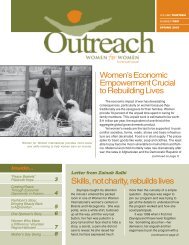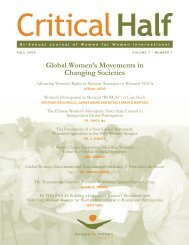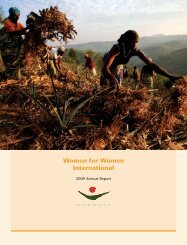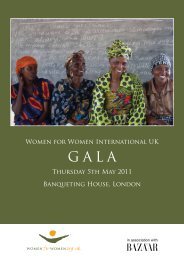Gender and Constitution Building - Women for Women International
Gender and Constitution Building - Women for Women International
Gender and Constitution Building - Women for Women International
You also want an ePaper? Increase the reach of your titles
YUMPU automatically turns print PDFs into web optimized ePapers that Google loves.
member of the House of Representatives nominated<br />
by the other women members of the House <strong>and</strong> appointed<br />
by the president. 23 A Caretaker Bougainville<br />
Executive Council, which will function as an Executive<br />
until appointments to the permanent Executive Council<br />
are made, is also to include a woman member of the<br />
House of Representatives. A Senior Appointment Committee<br />
will have one female representative, whose selection<br />
will be determined by law. There are no special<br />
provisions <strong>for</strong> inclusion of women in the Judicial branch,<br />
nor is there language <strong>for</strong> the creation of a Ministry of<br />
<strong>Women</strong>’s Affairs.<br />
Quotas <strong>for</strong> <strong>Women</strong>: Not Enough<br />
The Bougainville <strong>Constitution</strong>’s guarantees of political<br />
participation by women represent a positive<br />
change; the <strong>Constitution</strong> of Papua New Guinea, of<br />
which Bougainville remains a part, mentions women<br />
only once, calling <strong>for</strong> “equal participation by women<br />
citizens in all political, economic, social <strong>and</strong> religious<br />
activities.” 24 The approved <strong>Constitution</strong> <strong>for</strong> the Autonomous<br />
Region guarantees women three out of 39 total<br />
seats in the legislature. While a step <strong>for</strong>ward, especially<br />
considering early drafts of the <strong>Constitution</strong> guaranteed<br />
only one female representative, this is still a small percentage,<br />
<strong>and</strong> one falling far short of gender equality<br />
throughout the government. 25 Bougainville’s quota also<br />
falls short of the UN goal of 30 percent participation<br />
by women. 26<br />
In some instances, quotas <strong>for</strong> women like those included<br />
in Bougainville’s <strong>Constitution</strong> are able to promote<br />
representation in excess of the minimum required;<br />
in others they function more as window dressing than<br />
true inclusivity. Bougainville’s guarantee of less than<br />
eight percent of women in the legislature is not a very<br />
aggressive quota. To ensure women’s influence, both<br />
politically <strong>and</strong> in other realms, <strong>and</strong> to break down gender<br />
barriers, more than token representation is needed.<br />
Otherwise, quotas risk confining women’s participation<br />
to representation of only women’s issues <strong>and</strong> limiting<br />
their political opportunity. For instance, the requisite<br />
three women on the Bougainville <strong>Constitution</strong>al Commission<br />
were nominated to represent women’s interests<br />
in their three regions; none were chosen to represent<br />
any other interests, groups or organizations.<br />
Furthermore, representation does not guarantee<br />
influence. Leaving aside whether women, in fact, will<br />
prove to be the best advocates <strong>for</strong> women’s rights, gender<br />
awareness <strong>for</strong> both men <strong>and</strong> women decision-makers<br />
is necessary to advance the position of women. And<br />
those with such awareness must wield real power. 27<br />
It is apparent that Bougainville as a whole can benefit<br />
if women can move beyond these quotas politically<br />
<strong>and</strong> gain influence in all aspects of society. Perhaps<br />
Bougainville’s flourishing NGO community, of which<br />
women are a large part, bodes well <strong>for</strong> the continued<br />
involvement of women in society <strong>and</strong> may translate into<br />
their increased involvement in political life.<br />
L<strong>and</strong> Issues <strong>and</strong> Rights<br />
L<strong>and</strong> ownership, a traditional source of women’s<br />
power, is also integral to women’s broader influence in<br />
Bougainville. 28 All of Papua New Guinea, including<br />
Bougainville, is undergoing l<strong>and</strong> re<strong>for</strong>ms that impact the<br />
country’s development <strong>and</strong> traditions. The majority of<br />
PNG’s population survives on subsistence farming, curtailing<br />
the availability of l<strong>and</strong> <strong>for</strong> other uses. Pressures<br />
<strong>for</strong> l<strong>and</strong> to be made available <strong>for</strong> cultivation or mining<br />
are <strong>for</strong>cing an ongoing, often disruptive, transition to a<br />
cash economy, further contributing to l<strong>and</strong> shortages. 29<br />
PNG’s people are closely tied to <strong>and</strong> dependent on<br />
their l<strong>and</strong>, both <strong>for</strong> livelihood <strong>and</strong> as a means of preserving<br />
kinship ties <strong>and</strong> community structure. For<br />
women in Bougainville, l<strong>and</strong> is especially important because<br />
of the high concentration of matrilineal tribes in<br />
which l<strong>and</strong> is passed down from mother to daughter. In<br />
Papua New Guinea as a whole, only three percent of<br />
the l<strong>and</strong> is alienated, while 97 percent remains under<br />
customary control according to unwritten laws <strong>and</strong> traditions<br />
<strong>and</strong> the population is generally wary about governmental<br />
control of customary l<strong>and</strong>. 30 Matrilineal inheritance<br />
could diminish with <strong>for</strong>malization of l<strong>and</strong><br />
ownership because <strong>for</strong>mal registration tends to result in<br />
men holding the official l<strong>and</strong> title. 31<br />
Bougainville’s <strong>Constitution</strong> specifically addresses<br />
these contentious issues. It m<strong>and</strong>ates that the new government<br />
develop a l<strong>and</strong> policy that “provide[s] <strong>for</strong> the<br />
protection of the customary powers of heads of matrilineal<br />
<strong>and</strong> patrilineal societies <strong>and</strong> of customary owners<br />
in relation to customary l<strong>and</strong>.” 32 The government is also<br />
to recognize traditional systems of government, the roles<br />
<strong>and</strong> responsibilities of traditional chiefs <strong>and</strong> other traditional<br />
leaders <strong>and</strong> of the clan system “wherever practicable<br />
<strong>and</strong> possible.” 33 Finally, in managing <strong>and</strong> preventing<br />
damage to natural resources, the government of<br />
Bougainville is required to direct the laws <strong>and</strong> policies<br />
toward the recognition of customary rights. 34<br />
These provisions outline what could be an equitable<br />
l<strong>and</strong> policy if interpreted <strong>and</strong> implemented in a way that<br />
is sympathetic to women, but that interpretation will be<br />
impacted by tensions between respect <strong>for</strong> indigenous<br />
populations <strong>and</strong> their customs <strong>and</strong> traditions <strong>and</strong> the<br />
CRITICAL HALF 23







